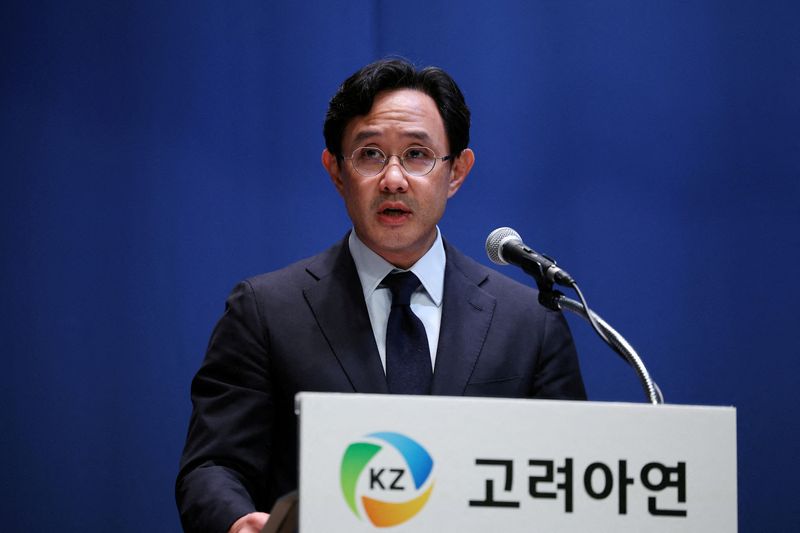By Hyunjoo Jin, Cynthia Kim and Kane Wu
SEOUL (Reuters) -A takeover battle over Korea Zinc is adding pressure on Seoul to pass legislative reforms to ensure better protections for all investors in a country with a stock market dominated by family-run conglomerates.
Korea Zinc Chairman Yun B. Choi, a grandson of a co-founder, last week agreed to scrap a controversial plan to issue new shares in the world’s largest zinc refiner to help fend off a takeover attempt from the co-founding family’s Youngpoong Corp and its partner, private equity group MBK Partners.
The share issue plan had infuriated many investors, as two days before it was announced, Korea Zinc finalised a buyback at a 25% higher price.
Choi backed down after a regulatory probe and intense shareholder pressure that brought international attention to corporate governance shortcomings in Asia’s fourth-largest economy.
But Korea Zinc’s actions under his leadership have fuelled scepticism over whether the government’s call for voluntary efforts by companies to boost depressed stock valuations is sufficient, according to interviews with more than a dozen investors, governance experts, regulators and lawmakers.
After Choi became chairman in 2022, Korea Zinc signed deals with LG Chem and Hanwha Corp (KS:00088K) to invest in each other, in an arrangement known as a cross-shareholding, though it sold shares in the latter this month to help repay debt. Under Choi, it also sold stock to strategic partners including Hyundai Motor (OTC:HYMTF) Group and Trafigura.
“Why do you use company funds, not your own money to increase your control?” asked Park Yoo-kyung, a managing director at Netherlands-based APG Asset Management, who noted Korea Zinc could have formed joint ventures or used other types of contracts.
Many companies in Japan are unwinding cross-shareholding deals, which have been criticised as negative for corporate governance because they can insulate management from having to meet the interests of shareholders.
Korea Zinc said the cross-shareholdings were needed to ensure stable partnerships as it expanded into battery materials, hydrogen and other businesses.
Hahm Yong-il, senior deputy governor of the Financial Supervisory Service, said Korea Zinc’s moves had fuelled investor doubts about board independence.
The regulator’s commitment to reforming and improving capital markets is being tested, said Hahm, whose agency is investigating allegedly unfair practices in Korea Zinc’s proposed share issue plan even after it was cancelled.
LEGISLATION PUSH
Korea Zinc’s actions show legislation is needed to protect the interests of minority shareholders and address the lack of board independence, particularly at family-run conglomerates known as chaebols, said the people interviewed by Reuters.
In South Korea, board members have a fiduciary duty to perform their duties in the company’s interests, but not to safeguard shareholders’ interests.
The Democratic Party, which has a majority in parliament, on Tuesday proposed a commercial law revision to extend the duty to shareholders, saying the Korea Zinc saga added urgency to long-delayed legislation.
But President Yoon Suk Yeol’s People Power Party and business groups have raised concerns that the legislation would hurt businesses.
A South Korean business association that includes conglomerates like Samsung (KS:005930) and Hyundai as members, though not Korea Zinc, issued a statement on Thursday warning businesses could be subject to shareholder lawsuits and attacks from “speculative” overseas funds if the law was amended.
Yoon can veto bills, and his office this month took a step back from its earlier positive stance on the commercial law changes.
In January, Yoon had pledged to address the so-called “Korea discount” to shore up support from the country’s more than 10 million retail investors, taking a leaf from Japan’s corporate governance reforms over the last few years that have drawn interest from global investors and sent Tokyo stocks to record highs this year.
The Korea discount refers to a tendency for South Korean companies to have lower valuations compared to their overseas peers due to low dividend payouts and the dominance of chaebols that often have weak governance practices.
Benchmark KOSPI index shares traded at a price-to-book multiple of 0.87 as of Wednesday, below an average of 1.2 for companies on Japanese exchanges and 4.8 for the S&P 500 in the U.S., according to data from the exchanges.
FIRST HOSTILE TAKEOVER
Korea Zinc’s Choi pledged to give up his role as chairman of the board and come up with measures to protect minority shareholders as he braces for a showdown with Youngpoong and MBK at a shareholder meeting early next year.
Their bid for control, if successful, would be the first hostile takeover of a South Korean company by a private equity fund, and should serve as a wake-up call for chaebols, according to LSEG data.
“What MBK is doing on Korea Zinc could potentially spur dozens of similar disputes at some 200 locally listed Korean companies,” said Mike Cho, a business school professor at Seoul’s Korea University.
The country has traditionally been a tough ground for activist investors such as Elliott, which over the last decade made unsuccessful attempts to block deals at Samsung affiliates and Hyundai Motor Group companies.
The number of activist campaigns annually in South Korea grew more than nine-fold between 2019 and 2023, according to Diligent Market Intelligence, though the outcomes have been mixed.
“There is a buzz among local capital market players that MBK’s deal with Korea Zinc could be a game changer,” said Sanghyun Park, an analyst at Clepsydra Capital. “It’s seen as a key step to tackle the Korea discount by shaking up ownership structures.”

